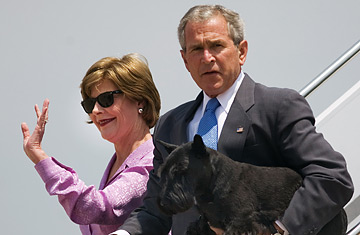
President George W. Bush, carrying his dog Barney, and First Lady Laura Bush step off Air Force One.
At his emotional goodbye with George W. Bush on the South lawn of the White House Monday, Karl Rove painted a portrait of a presidency made of strong vision and epochal goals. Rove, his voice trembling, said of Bush, "I've seen a man of far-sighted courage put America on a war footing and protect us against a brutal enemy in a dangerous conflict that will shape this new century. I've seen a leader respond to an economy weakened by recession, corporate scandal and terrorist attacks by taking decisive action to strengthen the economy and create jobs. I've seen a reformer who challenged his Administration, the Congress and the country to make bold changes to important institutions in great need of repair."
As the country heads into the 2008 election, the public's verdict on Bush and Rove's vision may not be nearly as kind. With poll numbers stacked against the G.O.P. nationwide, 2008 could become as great a rejection of signature Bush policies and his party as the 2006 mid-term election was. Thanks to that threat, the post-Rove White House already finds itself preoccupied with extracting itself from the shoals where Bush and Rove's grand visions have foundered. In that sense, the Bush Administration has already begun repudiating the grandest ideas, and the legacy, of the man who was its chief architect.
Led by chief of staff Josh Bolten, the White House has shifted from a policy of transforming Iraq to one of containing it. It has abandoned efforts to reshape immigration policy and budgetary priorities, instead looking to boost domestic border security and contain spending. And it is devoting major legal resources to the multiple investigations launched by Capitol Hill committees over the last six months, some of which target Rove himself, and many of which are the result of his famously aggressive mixing of policy and politics. White House officials portray each of these pursuits as sound management of existing issues, but to historians they look like damage control.
That's not to say the President has squandered away all his power. Bush's expansion of his eavesdropping authority after a lengthy battle with Congressional Democrats earlier this month shows the Administration still knows how to win when it comes to national security issues. And in many small ways the strength of the executive branch will allow Bush and his team to shape policies and events in Washington and the country. But on the overarching political issues that were supposed to create what Rove called a "lasting Republican majority," the Bush presidency is in the process of walking back.
The clean-up operation is driven less by an ideological shift than by political necessity: where Bush and Rove strove for long-term, systemic change and failed, Republican White House and Congressional candidates in 2008 are trying to succeed in the here and now. Iraq is the main threat to every Republican office-seeker in the country. Lack of border security and excessive spending cost the party in the last election, and are equally powerful potential negatives for the G.O.P. now. Anything that smacks of scandal at the White House in the next year and a half will fuel the popular impression of G.O.P. corruption that helped hand control of Congress to the Democrats.
The atmosphere in the White House now is appropriately sober. Deputy spokesperson Dana Perino said Monday of Rove's departure that "the entire White House is feeling... that punch today." None of the close group of Texans that organized and ran Bush's 2000 campaign remain at the White House: Rove followed Dan Bartlett's departure earlier in the summer; Bush's longtime legal advisor Harriet Miers left early this year; and Bush's close allies Alberto Gonzales and Karen Hughes are serving, respectively, at the Justice and State departments. Rove's position at the White House, a unique combination of several powerful policy and political jobs, is expected to be broken up into smaller portfolios.
The White House can point, as Rove did Monday, to Bush's perceived success at battling terrorism at home, a still solid economy and lower taxes. But at this point, with the burden of a series of failed, long-term agenda items, the hopes for building up this Administration's legacy will have to be modest. Faced with the same challenge, Karl Rove would undoubtedly have gone on the offensive. But the White House will be operating under different leadership now, and it will have a hard enough time playing defense.
